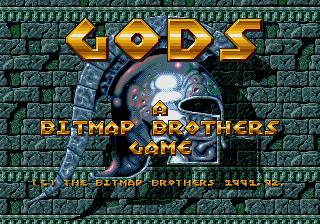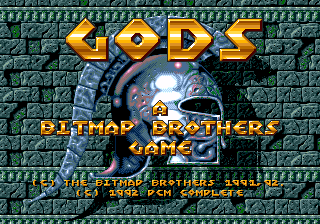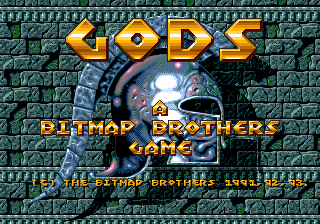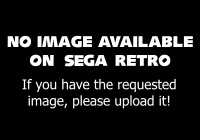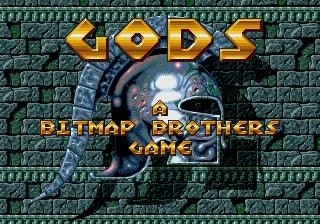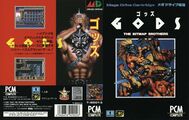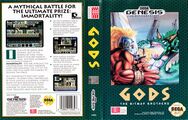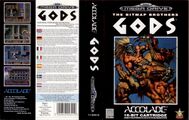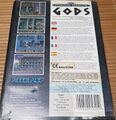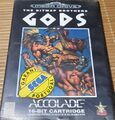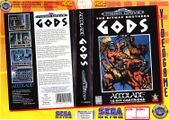Gods
From Sega Retro
| |||||||||||||||||||||||||||||||||||||||||||||||||||||||
| Gods | |||||||||||||||||||||||||||||||||||||||||||||||||||||||
|---|---|---|---|---|---|---|---|---|---|---|---|---|---|---|---|---|---|---|---|---|---|---|---|---|---|---|---|---|---|---|---|---|---|---|---|---|---|---|---|---|---|---|---|---|---|---|---|---|---|---|---|---|---|---|---|
| System(s): Sega Mega Drive | |||||||||||||||||||||||||||||||||||||||||||||||||||||||
| Publisher: Mindscape (US), PCM Complete (Japan), Accolade (Europe) | |||||||||||||||||||||||||||||||||||||||||||||||||||||||
| Developer: Graftgold | |||||||||||||||||||||||||||||||||||||||||||||||||||||||
| Distributor: Ecofilmes (PT), Hent Gruppen (SE rental), Datart International (CZ), Metro Games (AU) | |||||||||||||||||||||||||||||||||||||||||||||||||||||||
| Licensor: Renegade Software[1], The Bitmap Brothers[1] | |||||||||||||||||||||||||||||||||||||||||||||||||||||||
| Original system(s): Atari ST | |||||||||||||||||||||||||||||||||||||||||||||||||||||||
| Developer(s) of original games: The Bitmap Brothers | |||||||||||||||||||||||||||||||||||||||||||||||||||||||
| Sound driver: Graftgold custom | |||||||||||||||||||||||||||||||||||||||||||||||||||||||
| Genre: Action[1][2] | |||||||||||||||||||||||||||||||||||||||||||||||||||||||
| Number of players: 1 | |||||||||||||||||||||||||||||||||||||||||||||||||||||||
| |||||||||||||||||||||||||||||||||||||||||||||||||||||||
|
Gods (ゴッズ) is a 1991 platformer by The Bitmap Brothers, originally released for the Atari ST and later ported to a variety of home consoles and computers, including a 1992 port to the Sega Mega Drive. This version was the first game published by Accolade after acquiring an official license after winning Sega v. Accolade (though they still presumably continued to press unlicensed games).
Contents
Story
"Four guardians" have broken the citadel used to protect the city of the Gods, and have asked any warrior to retake the citadel in return for a favor. The greatest gift of all: immortality. The player controls one such warrior, who asks to become a God himself, equal to the others.
Gameplay
![]() shoots the player's weapon (which they carry one of and find throughout each level), and
shoots the player's weapon (which they carry one of and find throughout each level), and ![]() jumps. Ladders can be jumped off by pressing HOLD
jumps. Ladders can be jumped off by pressing HOLD ![]()
![]() or
or ![]() . By pressing
. By pressing ![]() , the player will face the wall, and can then use
, the player will face the wall, and can then use ![]() to do actions like flipping switches on the wall. The player can carry up to four extra items with them, such as keys (used to open doors). To take an item, the player should hold
to do actions like flipping switches on the wall. The player can carry up to four extra items with them, such as keys (used to open doors). To take an item, the player should hold ![]() to crouch and press
to crouch and press ![]() to pick the item up and put it in one of four slots (shown in the HUD), and then hit
to pick the item up and put it in one of four slots (shown in the HUD), and then hit ![]() again to move the cursor to the next slot. To drop an item, move the cursor onto an item and leave item grabbing mode. The player does not need to drop items to use keys; they activate automatically they you approach a door.
again to move the cursor to the next slot. To drop an item, move the cursor onto an item and leave item grabbing mode. The player does not need to drop items to use keys; they activate automatically they you approach a door.
Passwords are given out at the end of each world after defeating the respective boss. Should the player continue using a password, they will be given a pre-defined amount of money to power up with.
Enemies' appearance changes from world to world and sometimes also from stage to stage, but their behavior can be categorized:
- Walking a predefined path.
- Walking straight towards the player's position.
- Flying towards the player's position.
- Turret-like behavior.
- So-called "thieves" take a special position. Starting with world 2, these characters will grab items and carry them around. They can be attracted by dropping a golden key, the item they desire the most. They can be utilized to transport items out of areas they player can't reach by themselves.
Points are accumulated by defeating enemies and collecting treasure, often hidden away in secret areas that can only be accessed by solving puzzle sections. A lot of the bonus sections are very hard to find without the use of external resources. The game has a self adaptive difficulty level, sometimes giving out health and extra lives to players instead of score related items. Extra lives and bonus points are rewarded for certain scores. As all score is lost when powering off the console, a play session focusing on score needs to be done in one sitting.
While the score system was carefully crafted, a design oversight exists: The beehives in the labyrinth stage release an unlimited amount of bees, and thus infinite score can be accumulated.
Weapons
Main weapons
- Each weapon has three power levels. Level 1 is a straight shot, level 2 is straight and upward, level 3 is straight, upward and downward. The angle the weapons are fired can be altered by pickups.
| Knife | |
|---|---|
| Standard equipment. | |
| Throwing Star | |
| Stronger than the knife. | |
| Spear | |
| Stronger than the throwing star, goes through walls. | |
| Mace | |
| Weaker than the knife, can break certain blocks. | |
| Axe | |
| Strongest weapon, no special properties. |
Sub weapons
Aside from the main weapons, the game also features sub weapons, which are fired simultaneously with the main weapons.
| Energy Star | |
|---|---|
| Arching shot, can be used together with the hammer. | |
| Hammer | |
| Jumps along the floor until it finds a target. | |
| Spiked Ball | |
| Homing shot, |
Worlds
Each world is split into three sections. Between these individual sections, new weapons, power ups and other items may be purchased at a traveling merchant's shop.
| The City | |
|---|---|
| The Temple | |
| The Labyrinth | |
| The Underworld | |
Versions
All versions are region locked. The PAL version has speed up music but slower gameplay. Disabling the region lock with a cheating device (e.g. Game Genie code EAAT-AL1T) makes the game and music run at the correct speed. Content wise, the games are identical aside from translation differences.
Compared to the Atari ST and Amiga releases, the home console ports feature:
- A new, animated intro screen (but without the image song) compared to the still image of the original.
- In-game music was added, while the ST and Amiga releases were silent.
- New HUD that displays all items. This works without compromising the visible area as the Sega Mega Drive version runs at a slightly higher resolution.
- Some palette changes in all stages, likely due to the higher amount of simultaneously displayed foreground colors - Amiga:32 MD:64 (e.g. the hero's armor is slightly blue colored compared to the grey ST version armor, enemies now have their own palettes).
- The Amiga's "copper mode" background gradients, which can't be reproduced on the Sega Mega Drive without heavy dithering, have been replaced with parallax scrolling buildings and scenery.
- The final ascension to Olympus scene was made exclusively for console versions.
- The ability to perform a straight vertical jump was added & walking speed is much faster, making it possible to clear the game in ~1 hour (compared to the Amiga version, which took ~2 hours).
- In the Atari ST version, the player is given "immortality" by receiving a screen full of 1UP items after the final boss, which is missing in the Sega Mega Drive version. The extended ending scene is a replacement for this.
- The game doesn't loop infinitely with an increased difficulty level after clearing it. Instead it brings the player to the highscore screen.
Production credits
- Design: Eric Matthews, Steve Tall
- Original Coding: Steve Tall
- Graphics: Mark Coleman
- Original Music: John Foxx
- Sega Conversion: Gary J. Foreman at Graftgold Ltd.
- Sega Sound: Jason Page
- Additional Graphics: Mark Coleman, Eric Matthews, Philip Williams
Magazine articles
- Main article: Gods/Magazine articles.
Promotional material
Physical scans
| 77 | |
|---|---|
| Based on 44 reviews | |
| Mega Drive, SE (rental; Hent; orange) |
|---|
| Mega Drive, CZ (Datart) |
|---|
Technical information
- Main article: Gods/Technical information.
References
NEC Retro has more information related to Gods
|
- ↑ 1.0 1.1 1.2 File:Gods MD JP Box.jpg
- ↑ 2.0 2.1 https://sega.jp/history/hard/megadrive/software_l.html (Wayback Machine: 2020-07-02 23:21)
- ↑ Sega Visions, "November/December 1992" (US; 1992-xx-xx), page 93
- ↑ GamePro, "January 1993" (US; 199x-xx-xx), page 61
- ↑ Game Informer, "November/December 1992" (US; 1992-1x-xx), page 41
- ↑ 6.0 6.1 Mean Machines Sega, "January 1994" (UK; 1993-11-30), page 67
- ↑ MAN!AC, "11/93" (DE; 1993-xx-xx), page 12
- ↑ 8.0 8.1 MAN!AC, "12/93" (DE; 1993-11-10), page 47
- ↑ Sega Pro, "December 1993" (UK; 1993-11-11), page 95
- ↑ 10.0 10.1 Computer & Video Games, "June 1993" (UK; 1993-05-15), page 99
- ↑ File:Gods MD credits.pdf
- ↑ 1700 igr dlya Sega, "" (RU; 2001-xx-xx), page 89
- ↑ Alaab Alcomputtar, "" (SA; 1995-08-xx), page 73
- ↑ Aktueller Software Markt, "Juli 1994" (DE; 1994-06-06), page 118
- ↑ Beep! MegaDrive, "May 1993" (JP; 1993-04-08), page 23
- ↑ Consoles +, "Décembre 1993" (FR; 1993-1x-xx), page 172
- ↑ Computer & Video Games, "January 1994" (UK; 1993-12-15), page 71
- ↑ Digitiser (UK) (1993-04-09)
- ↑ Entsiklopediya luchshikh igr Sega. Vypusk 1, "" (RU; 1999-xx-xx), page 319
- ↑ Mean Machines: The Essential Sega Guide, "" (UK; 1993-11-18), page 52
- ↑ Famitsu, "1993-04-16" (JP; 1993-04-02), page 37
- ↑ GameFan, "Volume 1, Issue 1: October 1992" (US; 1992-xx-xx), page 6
- ↑ GamePro, "January 1993" (US; 199x-xx-xx), page 60
- ↑ Games World (Teletext) (UK) (+0:00)
- ↑ Hippon Super, "January 1993" (JP; 1992-12-04), page 83
- ↑ Sega Mega Drive Advanced Gaming, "November 1992" (UK; 1992-xx-xx), page 38
- ↑ Sega Mega Drive Advanced Gaming, "January 1993" (UK; 199x-xx-xx), page 92
- ↑ Mega, "January 1994" (UK; 1993-12-16), page 87
- ↑ Mega, "April 1994" (UK; 1994-03-17), page 63
- ↑ Mega Action, "June 1993" (UK; 1993-05-20), page 65
- ↑ Mega Action, "December 1993" (UK; 1993-11-04), page 42
- ↑ Mega Force, "Décembre 1993" (FR; 1993-12-10), page 90
- ↑ Mega Fun, "11/92" (DE; 1992-10-xx), page 39
- ↑ Mega Machines, "January 1994" (UK; 1993-12-09), page 40
- ↑ MegaTech, "November 1992" (UK; 1992-10-20), page 50
- ↑ Marukatsu Mega Drive, "January 1993" (JP; 1992-12-xx), page 107
- ↑ Mean Machines Sega, "November 1992" (UK; 1992-10-xx), page 90
- ↑ Player One, "Décembre 1993" (FR; 1993-1x-xx), page 157
- ↑ Play Time, "5/93" (DE; 1993-04-07), page 106
- ↑ Power Unlimited, "Nummer 5, December 1993" (NL; 1993-12-01), page 42
- ↑ Sega Power, "December 1993" (UK; 1993-11-xx), page 98
- ↑ Sega Pro, "November 1992" (UK; 1992-10-08), page 34
- ↑ Sega Pro, "April 1993" (UK; 1993-03-11), page 65
- ↑ Sega Pro, "November 1993" (UK; 1993-10-14), page 62
- ↑ Sega Zone, "November 1992" (UK; 1992-10-28), page 60
- ↑ Sega Zone, "December 1993" (UK; 1993-11-25), page 54
- ↑ Sega Force, "2/94" (SE; 1994-02-23), page 12
- ↑ Sega Mega Drive Review, "1" (RU; 1995-04-03), page 57
- ↑ Sega Saturn Magazine, "September 1995" (JP; 1995-08-08), page 87
- ↑ Sonic the Comic, "February 4th 1994" (UK; 1994-01-22), page 12
- ↑ Todo Sega, "Diciembre 1993" (ES; 1993-1x-xx), page 76
- ↑ Tricks 16 bit, "Tricks Sega Gold 800 igr" (RU; 1998-03-20), page 16
- ↑ Video Games, "12/92" (DE; 1992-11-23), page 64
| Gods | |
|---|---|
|
Main page | Comparisons | Maps | Hidden content | Development | Magazine articles | Video coverage | Reception | Region coding | Technical information | Bootlegs
Prototypes: 1992-06
| |
- 1 player games
- JP Mega Drive games
- All JP games
- US Mega Drive games
- All US games
- US Sega Channel games
- EU Mega Drive games
- All EU games
- DE Mega Drive games
- All DE games
- PT Mega Drive games
- All PT games
- UK Mega Drive games
- All UK games
- SE Mega Drive games
- All SE games
- CZ Mega Drive games
- All CZ games
- AU Mega Drive games
- All AU games
- Mega Drive games
- 1992 Mega Drive games
- All 1992 games
- Mega Drive action games
- All action games
- All games
- Gods
